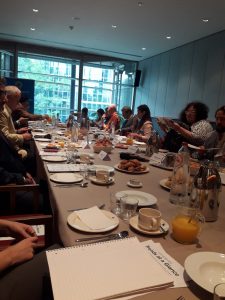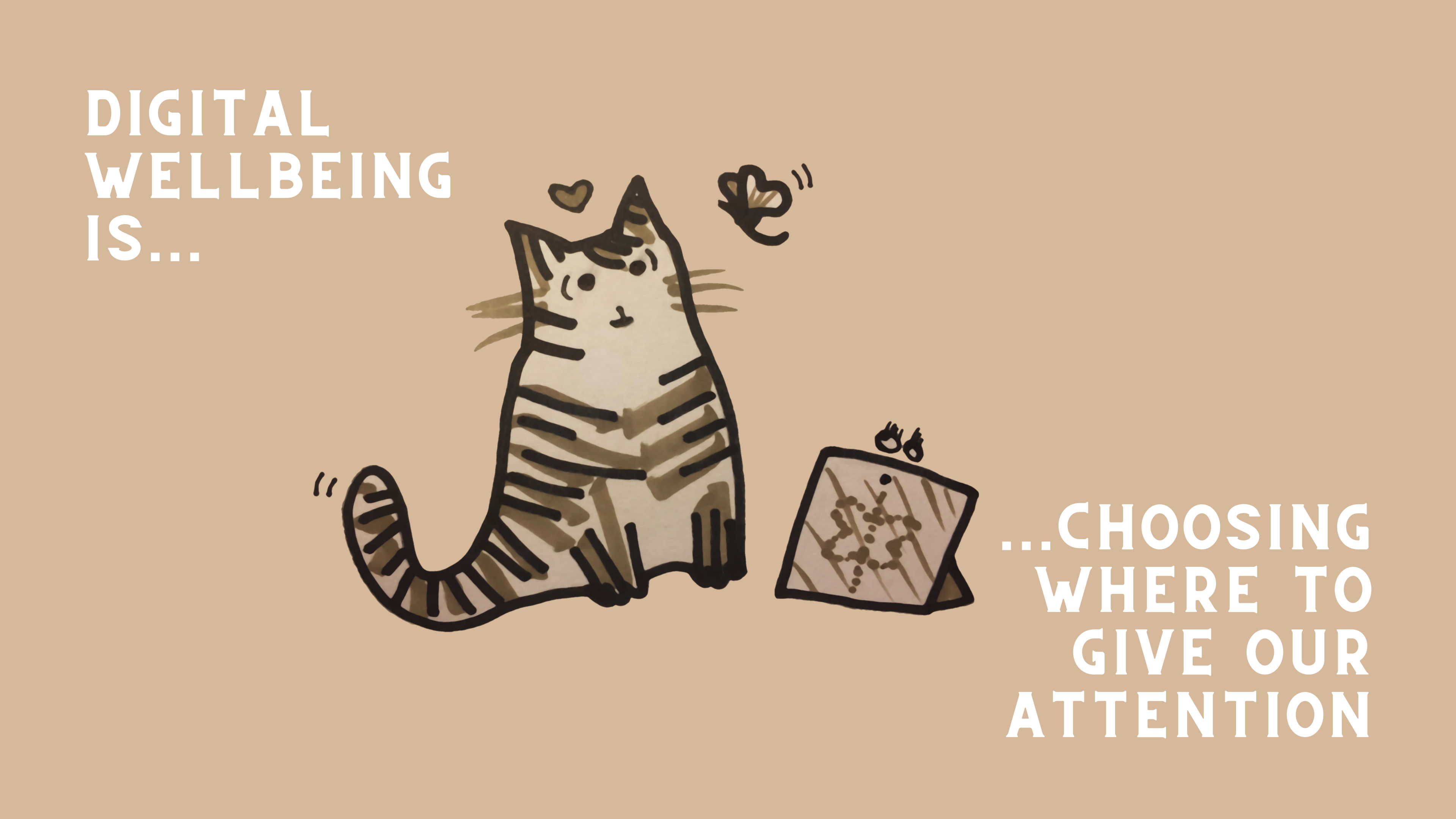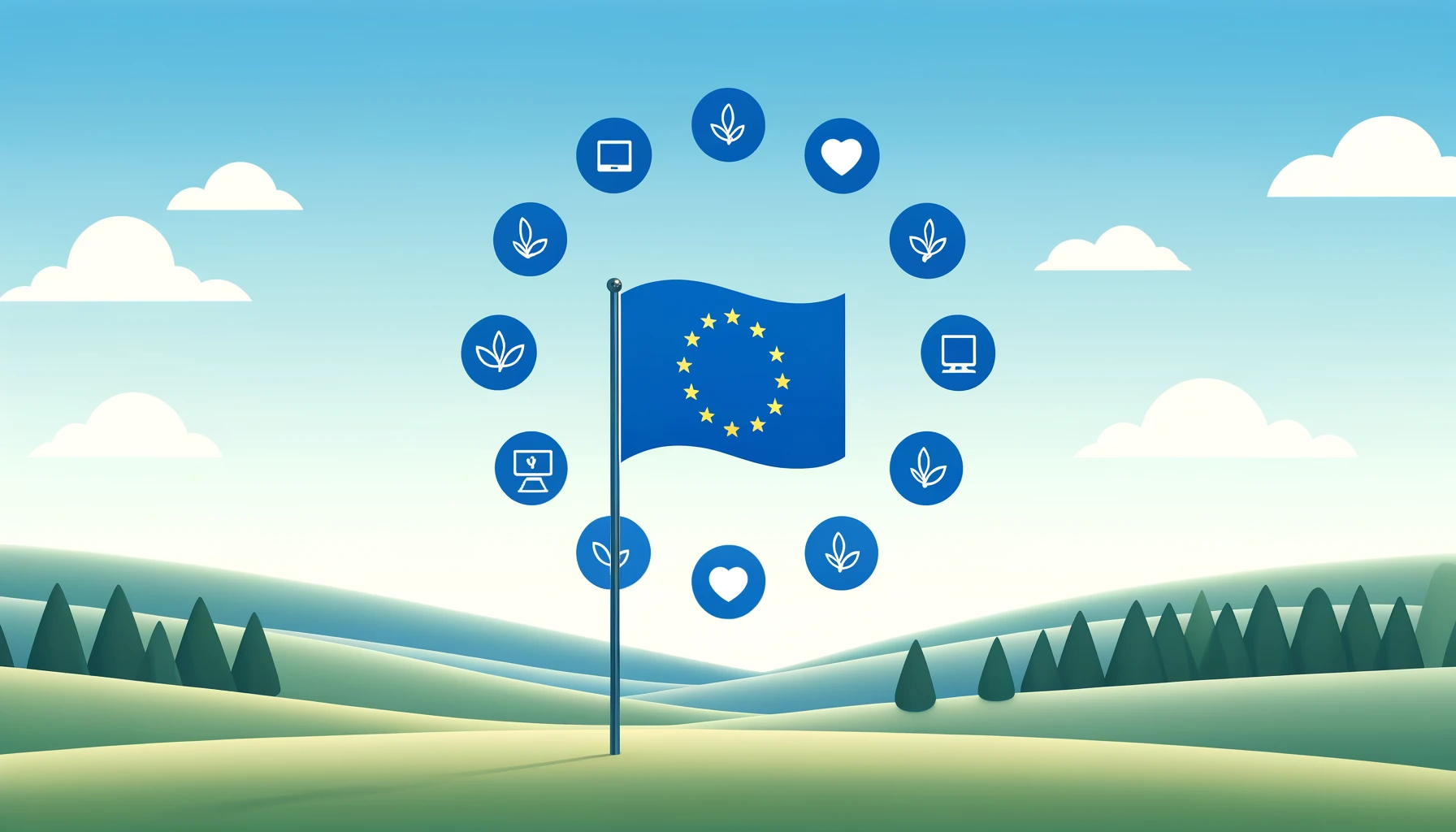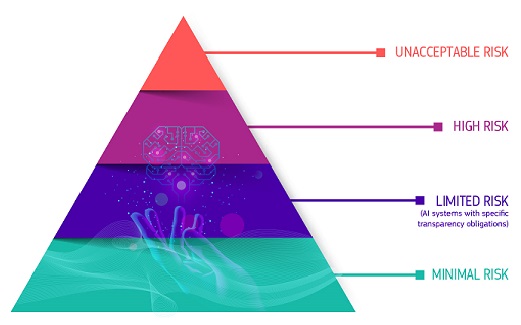
On Wednesday, 20 June 2018, the European Internet Forum met at their ‘EIF breakfast: World Refugee Day: the role of the Internet and ICTs,’ at the European Parliament. On World Refugee Day, many events were held to discuss the important issues of refugees, the migrant flows to Europe, and the importance of social integration in new host countries. Based on EAVI’s past and current work surrounding media literacy and migrants, I had the fortune to attend, representing EAVI. As for my role here, I am currently responsible for the follow-up of our concluded MyStory project, aimed at assisting organisations working with migrants and refugees in education them about the media, and our new (soon to be launched) campaign, #BuildingTrust.
A number of prominent speakers attended the event including Members of Parliament and European Internet Forum members at the European Parliament in Brussels. There were also representatives from a wide variety of organisations, including UNCHR and Microsoft, alongside the European Commission and European Parliament representatives. It was a bit frightening for me to be present at such high level meeting. The discussion was about the importance and role of technology in refugee life, the main question was: what more can we do to improve refugees’ life with the Internet and ICTs? The conversation aimed to clarify the role and the impact of digital technologies today, and how we can better understand refugees and their needs.
MEP Julie Ward of the Group of the Progressive Alliance of Socialists and Democrats in the European Parliament and member of the UK Labour Party stated:
“We need to make sure that we use technology and offer the technology for online interaction to refugees who need to stay connected. Maybe they are separated from their families, their communities, they want to know what’s going on in the world, and they have a right to be in the internet world, in the online world as much as we are.”
Following this, MEP Brando Benifei of the Group of the Progressive Alliance of Socialists and Democrats in the European Parliament and member of the Italian party, Partito Democratico, continued by adding:
“The refugees in Europe can have more opportunities to ICT because through ICT they can access knowledge of their status, of their rights of their opportunities also of their duties, as asylum seekers and refugee. And to have means of communication with locals for matching opportunities for meeting. There are specific apps and portals that are being developed for these specific objective of meeting locals and refugees to develop skill certification. So there is a whole array of opportunities that can be developed with ICT.”
These views resonate with me in particular due to my own personal experience in this very subject. While currently a master student at Solvay Business and Management School, I am also a legal refugee in Belgium. As such, participating in this meeting was of particular interest to me and I was very tense when I was handed the microphone to introduce myself, especially as those in attendance were influential people.
On hearing that I have refugee status here, those in attendance were very interested to hear my opinions and hear about my situation. The debate then turned to focus on me! With many asking several questions about refugees and their use of technology as many studies and statistics indicate that refugees are using smart phones to a large extent.
This also meant again that there were some very personal questions directed at me. For instance, they were very interested in why I chose Belgium. They were curious whether I had some information about Belgium before coming here and where I found this information and the sources. Through my own personal experience, and practical experience in EAVI, I tried my best to answer their questions.
Unfortunately, there are not many refugees who are in a position where they can communicate directly with decision-makers. I feel there should be more done to enable this participation and open the way to share personal experiences and needs. I do not even know if there is a spokesman for refugees. In gathering this personal information we can use it to create a better situation and understanding between refugees and receiving countries. This can benefit both and create a better society in the long-run.
I am so glad to have had this opportunity to give a voice to refugees and I am very proud of my participation. I feel that this experience has encouraged me to continue my work in highlighting the refugee situation also in respect of the media world which is surrounding us all. The attendees were very encouraging and welcomed me to attend future events. It is also nice to gain more knowledge about their efforts and to recognise the organisations that are interested in the role of technology in refugees’ life. While adding to my personal experiences, it will also play a big role in shaping my master’s thesis research in September based on the relationship between the use of technology and refugees’ life.
As mentioned before though, it is difficult for me to get a personal invitation to attend such events. Therefore I hope that I can maintain my position at EAVI and contact with those that I met, so that I will participate even more effectively in the future.
Creating a real direct link between those that are experiencing these life changing journeys and those that make political decisions is crucial, and I hope that I can continue to be a part of enabling this.
This article was written by Lama Jaghjougha, public relations and communications assistant at EAVI.

On Wednesday, 20 June 2018, the European Internet Forum met at their ‘EIF breakfast: World Refugee Day: the role of the Internet and ICTs,’ at the European Parliament. On World Refugee Day, many events were held to discuss the important issues of refugees, the migrant flows to Europe, and the importance of social integration in new host countries. Based on EAVI’s past and current work surrounding media literacy and migrants, I had the fortune to attend, representing EAVI. As for my role here, I am currently responsible for the follow-up of our concluded MyStory project, aimed at assisting organisations working with migrants and refugees in education them about the media, and our new (soon to be launched) campaign, #BuildingTrust.
A number of prominent speakers attended the event including Members of Parliament and European Internet Forum members at the European Parliament in Brussels. There were also representatives from a wide variety of organisations, including UNCHR and Microsoft, alongside the European Commission and European Parliament representatives. It was a bit frightening for me to be present at such high level meeting. The discussion was about the importance and role of technology in refugee life, the main question was: what more can we do to improve refugees’ life with the Internet and ICTs? The conversation aimed to clarify the role and the impact of digital technologies today, and how we can better understand refugees and their needs.
MEP Julie Ward of the Group of the Progressive Alliance of Socialists and Democrats in the European Parliament and member of the UK Labour Party stated:
“We need to make sure that we use technology and offer the technology for online interaction to refugees who need to stay connected. Maybe they are separated from their families, their communities, they want to know what’s going on in the world, and they have a right to be in the internet world, in the online world as much as we are.”
Following this, MEP Brando Benifei of the Group of the Progressive Alliance of Socialists and Democrats in the European Parliament and member of the Italian party, Partito Democratico, continued by adding:
“The refugees in Europe can have more opportunities to ICT because through ICT they can access knowledge of their status, of their rights of their opportunities also of their duties, as asylum seekers and refugee. And to have means of communication with locals for matching opportunities for meeting. There are specific apps and portals that are being developed for these specific objective of meeting locals and refugees to develop skill certification. So there is a whole array of opportunities that can be developed with ICT.”
These views resonate with me in particular due to my own personal experience in this very subject. While currently a master student at Solvay Business and Management School, I am also a legal refugee in Belgium. As such, participating in this meeting was of particular interest to me and I was very tense when I was handed the microphone to introduce myself, especially as those in attendance were influential people.
On hearing that I have refugee status here, those in attendance were very interested to hear my opinions and hear about my situation. The debate then turned to focus on me! With many asking several questions about refugees and their use of technology as many studies and statistics indicate that refugees are using smart phones to a large extent.
This also meant again that there were some very personal questions directed at me. For instance, they were very interested in why I chose Belgium. They were curious whether I had some information about Belgium before coming here and where I found this information and the sources. Through my own personal experience, and practical experience in EAVI, I tried my best to answer their questions.
Unfortunately, there are not many refugees who are in a position where they can communicate directly with decision-makers. I feel there should be more done to enable this participation and open the way to share personal experiences and needs. I do not even know if there is a spokesman for refugees. In gathering this personal information we can use it to create a better situation and understanding between refugees and receiving countries. This can benefit both and create a better society in the long-run.
I am so glad to have had this opportunity to give a voice to refugees and I am very proud of my participation. I feel that this experience has encouraged me to continue my work in highlighting the refugee situation also in respect of the media world which is surrounding us all. The attendees were very encouraging and welcomed me to attend future events. It is also nice to gain more knowledge about their efforts and to recognise the organisations that are interested in the role of technology in refugees’ life. While adding to my personal experiences, it will also play a big role in shaping my master’s thesis research in September based on the relationship between the use of technology and refugees’ life.
As mentioned before though, it is difficult for me to get a personal invitation to attend such events. Therefore I hope that I can maintain my position at EAVI and contact with those that I met, so that I will participate even more effectively in the future.
Creating a real direct link between those that are experiencing these life changing journeys and those that make political decisions is crucial, and I hope that I can continue to be a part of enabling this.
This article was written by Lama Jaghjougha, public relations and communications assistant at EAVI.

On Wednesday, 20 June 2018, the European Internet Forum met at their ‘EIF breakfast: World Refugee Day: the role of the Internet and ICTs,’ at the European Parliament. On World Refugee Day, many events were held to discuss the important issues of refugees, the migrant flows to Europe, and the importance of social integration in new host countries. Based on EAVI’s past and current work surrounding media literacy and migrants, I had the fortune to attend, representing EAVI. As for my role here, I am currently responsible for the follow-up of our concluded MyStory project, aimed at assisting organisations working with migrants and refugees in education them about the media, and our new (soon to be launched) campaign, #BuildingTrust.
A number of prominent speakers attended the event including Members of Parliament and European Internet Forum members at the European Parliament in Brussels. There were also representatives from a wide variety of organisations, including UNCHR and Microsoft, alongside the European Commission and European Parliament representatives. It was a bit frightening for me to be present at such high level meeting. The discussion was about the importance and role of technology in refugee life, the main question was: what more can we do to improve refugees’ life with the Internet and ICTs? The conversation aimed to clarify the role and the impact of digital technologies today, and how we can better understand refugees and their needs.
MEP Julie Ward of the Group of the Progressive Alliance of Socialists and Democrats in the European Parliament and member of the UK Labour Party stated:
“We need to make sure that we use technology and offer the technology for online interaction to refugees who need to stay connected. Maybe they are separated from their families, their communities, they want to know what’s going on in the world, and they have a right to be in the internet world, in the online world as much as we are.”
Following this, MEP Brando Benifei of the Group of the Progressive Alliance of Socialists and Democrats in the European Parliament and member of the Italian party, Partito Democratico, continued by adding:
“The refugees in Europe can have more opportunities to ICT because through ICT they can access knowledge of their status, of their rights of their opportunities also of their duties, as asylum seekers and refugee. And to have means of communication with locals for matching opportunities for meeting. There are specific apps and portals that are being developed for these specific objective of meeting locals and refugees to develop skill certification. So there is a whole array of opportunities that can be developed with ICT.”
These views resonate with me in particular due to my own personal experience in this very subject. While currently a master student at Solvay Business and Management School, I am also a legal refugee in Belgium. As such, participating in this meeting was of particular interest to me and I was very tense when I was handed the microphone to introduce myself, especially as those in attendance were influential people.
On hearing that I have refugee status here, those in attendance were very interested to hear my opinions and hear about my situation. The debate then turned to focus on me! With many asking several questions about refugees and their use of technology as many studies and statistics indicate that refugees are using smart phones to a large extent.
This also meant again that there were some very personal questions directed at me. For instance, they were very interested in why I chose Belgium. They were curious whether I had some information about Belgium before coming here and where I found this information and the sources. Through my own personal experience, and practical experience in EAVI, I tried my best to answer their questions.
Unfortunately, there are not many refugees who are in a position where they can communicate directly with decision-makers. I feel there should be more done to enable this participation and open the way to share personal experiences and needs. I do not even know if there is a spokesman for refugees. In gathering this personal information we can use it to create a better situation and understanding between refugees and receiving countries. This can benefit both and create a better society in the long-run.
I am so glad to have had this opportunity to give a voice to refugees and I am very proud of my participation. I feel that this experience has encouraged me to continue my work in highlighting the refugee situation also in respect of the media world which is surrounding us all. The attendees were very encouraging and welcomed me to attend future events. It is also nice to gain more knowledge about their efforts and to recognise the organisations that are interested in the role of technology in refugees’ life. While adding to my personal experiences, it will also play a big role in shaping my master’s thesis research in September based on the relationship between the use of technology and refugees’ life.
As mentioned before though, it is difficult for me to get a personal invitation to attend such events. Therefore I hope that I can maintain my position at EAVI and contact with those that I met, so that I will participate even more effectively in the future.
Creating a real direct link between those that are experiencing these life changing journeys and those that make political decisions is crucial, and I hope that I can continue to be a part of enabling this.
This article was written by Lama Jaghjougha, public relations and communications assistant at EAVI.






















































































































































